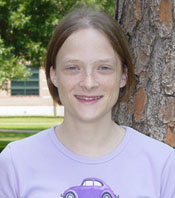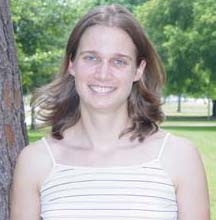Newsletter of the Cain Project in Engineering and Professional Communication at Rice University Fall 2003
Cain Project Home >> Newsletter
ENGI/NSCI 307 Students Gain a Global Perspective
This spring the Cain
Project launched a new course, ENGI/NSCI 307: Communication in Five Countries,
Many Cultures. The course focused on preparing students to “anticipate
the roles, situations and expected communication practices they would
encounter in engineering firms or other businesses” in other countries.
The course’s instructor, Dr. Ute Cezeaux, was very pleased with the
students’ enthusiasm. Most of the students had some experience abroad.
Julia Baumann, Danielle Dunn, and Marie Schweiterman agreed to reflect
and comment on how international/intercultural communication will affect
their futures.
 Julia
Baumann, a junior majoring in civil engineering, studied in Budapest,
Hungary in fall 2002. She took classes with students from many countries
including Cypress,
Iran and Libya at the Budapest University of Technology and Economics.
During that time she also traveled around Central Europe and Turkey.
Julia
Baumann, a junior majoring in civil engineering, studied in Budapest,
Hungary in fall 2002. She took classes with students from many countries
including Cypress,
Iran and Libya at the Budapest University of Technology and Economics.
During that time she also traveled around Central Europe and Turkey.
Julia found that Dr. Cezeaux’s class related quite a bit to her experiences
overseas. The class helped her understand the culture behind the teaching
styles of the Hungarian educational system. It also validated many of
the conclusions she had already formulated about how to communicate with
people from other cultures. She gained a better understanding of why the
methods she had used for communicating and coping in a foreign country
had proven successful.
Julia also felt that the discussion-based ENGI/NSCI 307 sessions forced
her to improve her speaking abilities. The actual business/communication
side of engineering had not been a part of her previous coursework. Julia
says, “While we (engineering students) all probably know that there
is more to the world than problems, tests and raw information, it is very
easy to forget.”
Danielle Dunn, a 2003 graduate in chemical engineering, has accepted a
job in the manufacturing  division
at Merck in Pennsylvania. Last summer she spent two months
division
at Merck in Pennsylvania. Last summer she spent two months
living in Turku, Finland, working as an intern at Abo Akademi, Turku’s
Swedish university. While there she traveled around the Nordiccountries.
Danielle is also very enthusiastic about her experience as a student in
ENGI/NSCI 307. Through the discussions at each class session with a guest
from a different culture (British, Chinese, German, Saudi Arabian and
Mexican), she discovered how to ask the right questions in order to learn
about the various cultures, and how to communicate effectively with people
from varied backgrounds. She also achieved a greater awareness of American
culture and how people from other countries perceive it.
Danielle plans to apply much of what she learned in the course when she
travels to Ireland this summer. She also feels that the information from
the course will be extremely useful in her new job.
Danielle hopes to someday interact with co-workers from all over the world.
The skills she developed will help her avoid cultural misunderstandings
and conflicts at work and will help her benefit from the diversity of
Merck’s employees.
 Marie
Schweiterman is also a graduating senior, majoring in mathematical economic
analysis. She would highly recommend the course to both engineering and
non-engineering
Marie
Schweiterman is also a graduating senior, majoring in mathematical economic
analysis. She would highly recommend the course to both engineering and
non-engineering
majors who think they may some day work in an international firm or who
may work abroad for an American firm. She says the course helped her learn
aspects of both
formal and informal communication in different cultures.
Marie has spent quite a bit of time working and studying abroad. While
growing up, she spent three summers in Mexico City, two summers in Germany,
and one year living with a host family in Potsdam, Germany, while in high
school. In college she spent one summer living in Vienna, working at the
American Embassy. The class discussions and readings in ENGI/NSCI 307
helped her gain a better understanding of the
people she met during her travels. She feels it is helpful to understand
others’ mannerisms, beliefs and value systems.
The course also prepared Marie to know how people in other countries with
different cultural backgrounds will expect her to act in both business
and casual environments. This will especially be helpful for her because
next year she plans to teach English in Japan through a Japanese government-sponsored
program. The class taught her a lot about Asian cultures and what to expect
in her new environment. She highly encourages students to take a course
like this to help them prepare for “real-life” careers in increasingly
international fields.